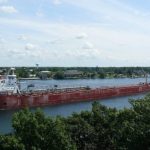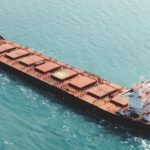The Global Conference on Naval Architecture and Ocean Engineering (G-NAOE) 2024, co-hosted by Lloyd’s Register (LR) and The Society of Naval Architects of Korea (SNAK), convened in Southampton this month to explore the latest advancements in sustainable ship technology and future trends in the maritime industry.
Across the four days, experts and stakeholders from around the world provided valuable insights across a range of topics including alternative fuels, digitalisation, maritime technical policy and safety.
One of the conference highlights was The CTO Ocean Forum, which brought together leading figures from the Korean shipbuilding industry, including Chief Technology Officers (CTOs) from Samsung Heavy Industries, HD Hyundai Heavy Industries, and Hanwha Ocean.
The panel examined the future for LNG, liquid CO2 and ammonia vessels and offshore production facilities, detailing the steps all three shipbuilders are taking to improve on current LNG carrier designs.
Samsung introduced its next-generation LNGC solution which features wind-assist technology, onboard carbon capture, e-fuel capability and increased cargo capacity.
HD Hyundai highlighted the essential role of digitalisation and automation through its Integrated Smart Ship (ISS) solution, which aims to centralise vessel operational data on the bridge and establish remote control centres to manage operations from shore.
Hanwha shared its investment in new technologies, including its new ship operating business Hanwha Shipping and an offshore drilling company.
Additionally, a high-level roundtable discussion allowed industry leaders to address the demand for joint development projects and evolving business models. They focused on strategies to mitigate the risks of technological obsolescence and promoting collaborative innovation across the maritime sector.
The conference also delved into geopolitical issues, including the potential impact of a second term for Donald Trump on fossil energy demand and the scaling up of lower carbon fuels.
In addition to technological advancements, the conference emphasised the importance of ecologically sustainable infrastructure. The concept of nature-positive engineering was presented as a crucial element in the maritime industry’s efforts to balance economic growth with environmental stewardship.
Several sessions highlighted the importance of maintaining safety while implementing sustainable innovation. An alternative fuels session featured two presentations from LR experts- lead technical specialist Louise Wright discussed the growing demand for risk-based certification, while technical specialist, Kyung-Tae Moon compared quantitative risk assessments for LNG, methanol and ammonia vessels.
Finally, Ruth Boumphrey, CEO of Lloyd’s Register Foundation, highlighted the long-standing maritime ties between Korea and the UK, noting LR’s 60 years in the Korean market. She emphasised the shared seafaring bond and outlined LR and the Foundation’s commitment to safety and ensuring societal benefits from shipping and ocean innovations.
Source: LR






